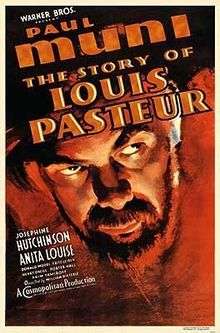The Story of Louis Pasteur
| The Story of Louis Pasteur | |
|---|---|
 | |
| Directed by | William Dieterle |
| Produced by | Henry Blanke |
| Written by |
Pierre Collings Sheridan Gibney |
| Starring |
Paul Muni Josephine Hutchinson Anita Louise Donald Woods |
| Music by | Leo F. Forbstein |
| Cinematography | Tony Gaudio |
| Edited by | Ralph Dawson |
| Distributed by | Warner Bros. |
Release dates |
|
Running time | 87 minutes |
| Country | United States |
| Language | English |
The Story of Louis Pasteur is a 1936 American black-and-white biographical film from Warner Bros., produced by Henry Blanke, directed by William Dieterle, that stars Josephine Hutchinson, Anita Louise, and Donald Woods, and Paul Muni as the renowned scientist who developed major advances in microbiology, which revolutionized agriculture and medicine. The film's screenplay was written by Pierre Collings and Sheridan Gibney, and Edward Chodorov (uncredited).
Muni won an Academy Award for Best Actor, while Collings and Gibney won for Best Screenplay and Best Story. The film was nominated for Best Picture.
Muni also won the Volpi Cup for Best Actor from the Venice Film Festival in 1936.
Plot
In nineteenth century chemist Louis Pasteur (Paul Muni) believes that diseases are caused by unseen microbes. His radical theory is dismissed by most doctors, particularly his most vocal critic, Dr Charbonnet (Fritz Leiber, Sr.). Nonetheless, Pasteur carries on, with the assistance of a small group of loyal researchers, and finds a cure for anthrax. He also campaigns to have doctors wash their hands and sterilize their instruments before operating.
Charbonnet is so certain that Pasteur is a quack that he injects himself with some of the rabies virus. When a triumphant Charbonnet shows no sign of contracting rabies, Pasteur is puzzled, until his wife suggests that the sample may have gotten weak with age. This sets him on the right path to finding a cure. When a frantic mother begs him to try his untested treatment on her son (Dickie Moore), who has been bitten by a rabid dog, Pasteur risks imprisonment and possibly the guillotine to save the child. Even Charbonnet finally concedes that he is right. In the end Pasteur is honored for his scientific accomplishments by the very dosctors who scoffed at his discoveries.
Cast
- Paul Muni as Louis Pasteur
- Josephine Hutchinson as Marie Pasteur
- Anita Louise as Annette Pasteur
- Donald Woods as Dr. Jean Martel
- Fritz Leiber as Dr. Charbonnet
- Henry O'Neill as Dr. Emile Roux
- Porter Hall as Dr. Rossignol
- Raymond Brown as Dr. Radisse
- Akim Tamiroff as Dr. Zaranoff
- Halliwell Hobbes as Dr. Lister
- Frank Reicher as Dr. Pfeiffer
- Dickie Moore as Joseph Meister
- Ruth Robinson as Mrs. Meister
- Walter Kingsford as Napoleon III
- Iphigenie Castiglione as Empress Eugénie
- Herbert Corthell as Louis Adolphe Thiers, President of France
Accolades
The film is recognized by American Film Institute in these lists:
- 2003: AFI's 100 Years...100 Heroes & Villains:
- Louis Pasteur – Nominated Hero[1]
- 2006: AFI's 100 Years...100 Cheers – Nominated[2]
Radio adaptations
Paul Muni reprised his role in two radio play versions of the film: the November 23, 1936, episode of Lux Radio Theater and the April 13, 1946, episode of Academy Award Theater.
References
- ↑ "AFI's 100 Years...100 Heroes & Villains Nominees" (PDF). Retrieved 2016-08-14.
- ↑ "AFI's 100 Years...100 Cheers Nominees" (PDF). Retrieved 2016-08-14.
External links
- The Story of Louis Pasteur at the TCM Movie Database
- The Story of Louis Pasteur at the Internet Movie Database
- The Story of Louis Pasteur at AllMovie
- The Story of Louis Pasteur at the American Film Institute Catalog
- The Story of Louis Pasteur at Virtual History
- The Internet Archive holds a radio adaptation of the film, originally broadcast on November 23, 1936 by Lux Radio Theater.